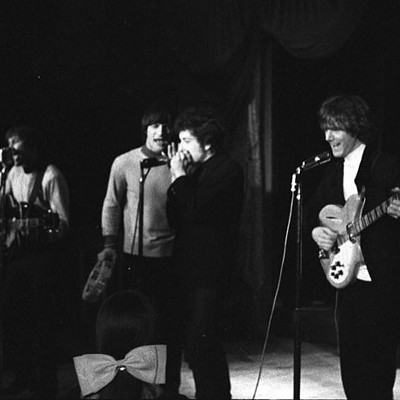There aren't many more concrete instances of one singer being so clearly connected to one song in the classic rock canon than Gary Wright with "Dream Weaver." The 1976 single, recorded with all synthesizers, reached No. 2 on the Billboard chart, has been a constant presence on radio and in movies (from Wayne's World to Toy Story 3), and is easily Wright's best-known number.
In fact, "The Dream Weaver" has also become a nom de plume for Wright, the URL of his official Web site, and the title of his upcoming autobiography, Dream Weaver: Music, Meditation, and My Friendship with George Harrison (Tarcher, 256 pp., $26.95). But the song, about God and inspired by Wright's intense devotion to Hindu religion and teachings, almost never made it on the album that would eventually bear the same name.
"It was the last song I put on the record, and I thought it was a nice little thing, but didn't put any credence in it," Wright says today. "I didn't think it would be [a hit]. But it took on a life of its own. And I feel very blessed and fortunate that I was able to have written a song that reached that kind of status."
In fact, Wright says that he has gotten e-mails over the years from people telling him that they were suicidal, but ultimately changed their thoughts after hearing the song's message of cosmic hope.
"I'm not saying that to glorify myself or say I'm some kind of spiritual giant, but I'm happy to have been an instrument in helping these people," he offers. "Writing that song was part of my own spiritual journey. And with all synthesizers, when it came out, it was just such a different sounding kind of record."
"Dream Weaver" and the record's other hit single, "Love is Alive," weren't Wright's first brush with success, either. He was the co-vocalist/keyboardist/songwriter with the well-regarded late '60s band Spooky Tooth, with featured the U.S.-born Wright with four Brits. The band was set to take off after the commercial and critical success of their sophomore release, 1969's Spooky Two.
But in one of the more tragic career blunders in classic-rock history, the band was coerced into making their next effort -- released the same year -- a collaboration with French electronic artist and "found object" composer Pierre Henry called Ceremony.
The concept effort took the form of a largely-instrumental church service, and the hideous cover featured a drawing of a man with a nail in the back of his head and a trickle of blood down the neck.
The only nail, however, relating to the band was the one Ceremony put in the coffin of their rising career. Wright left the band, which released one more album, and would reunite live and record sporadically through the decades.
"That was a really, really bad call by the record company. And Ceremony was mostly [Henry's] electronic music. Our contributions were minimal because his stuff was mixed really high," Wright says. "I already had a bunch of songs written for the next Spooky Tooth record that ended up on my first solo album. The next [Spooky Tooth record] could have been a big success."
As the title indicates, Wright's book is about more than just his musical career. Some of the best passages describe his deep and lasting friendship with George Harrison since Wright played on the ex-Beatle's first solo effort, All Things Must Pass.
Initially bonding over music, the two began to talk about more religious and spiritual matters, in particular the brand of Hinduism and guru teachings of which Harrison was a devotee.
Story continues on the next page.






